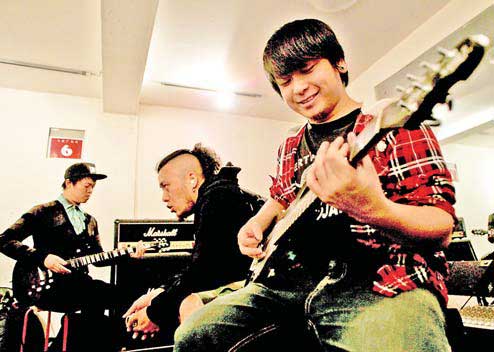Society
Rock music tunes into real life
(China Daily)
Updated: 2010-10-08 06:49
 |
Large Medium Small |
Unsteady rock
In 1994, Chinese Rock Power blew away music fans at the Hong Kong Arena. The star-studded concert, which featured He Yong, Dou Wei and Zhang Chu, the three giants of Moyan Records, is seen as a milestone in China's rock history.
Yet, many say it also marked the start of the decline.
As the country gradually shifted from a planned economy to a market economy, allowing greater cross-border trade, the music industry underwent a period of rapid commercialization.
Music flooded in from Taiwan and Hong Kong, as well from the West, in the 1990s soon put homegrown stars in the shade.
The situation was further compounded by the spread of dakou compact discs, which were seized at customs but usually resold on the black market. Until the introduction of the Internet in the early 1990s, the CDs were the No 1 choice for youngsters looking to keep tabs on the movers and shakers in global music.
"I first listened to Tang Dynasty and Black Panther (two popular bands) when I was in junior middle school," said frontman Min, "but when I got to senior high my friends gave me some dakou CDs. From then on, I was obsessed with Western music."
Magazine critic Wang said he blames the explosion in smuggled records for destroying the originality of Chinese rock.
"Batches of new bands have emerged since the end of the 1990s but they couldn't find their own sound," said the writer. "With dakou CDs, they were suddenly exposed to too much music and their brains filled up. No matter what they sing, it comes out like a type of music from the West."
In contrast, China's first generation of rock stars didn't know much about rock, "it was the very rare music they listened to that greatly touched them and triggered their creativity", he said.
As economic growth has outpaced artistic development in China, most bands' fan bases and incomes have remained low. Performance venues are also in short supply. Beijing's active music scene has hundreds of rock bands but just a few venues, such as D-22, Mao Livehouse and Yugong Yishan.
In a small practice room in Beijing's eastern Tongzhou district, Yu Chen was practicing with his band, Multi-Ego, ahead of their debut tour this winter. With gigs lined up in Shanghai, Chengdu, Nanjing, Wuhan and Hong Kong, the 22-year-old guitarist is going all out to raise his band's profile.
"We hope for the best but nobody knows. The atmosphere is different from city to city," he said. "It seems more people like rock now but we feel we get few 'echoes', which is a response from the bottom a listener's heart.
"I think it's the biggest difference between today's bands and China's earliest rock musicians," added Yu.
Festival fever
Concerts and tours are still lofty dreams for many bands, though, so the best way for new groups to increase their popularity is to perform at festivals. Music festivals nationwide have been one of the chief factors behind rock's recent revival, with ticket sales mushrooming since the early 2000s. Beijing alone will host about 50 festivals this year.
 Min Yan, center, lead singer of Last Chance of Youth, during a rehearsal with his group at a courtyard studio in Beijing. Min reformed the band last December. [Photo/China Daily]
|
"Since the record industry is dead in China, the festival is the only way to survive," said Zhao Mingyi, the drummer for Black Panther and deputy manager of concert promotion company Fenghua Qiushi, which in August staged Rock Heroes featuring legends like Cui Jian, Tang Dynasty and He Yong.
"Festivals are a good platform and have helped many young people foster and develop their interest in rock," he said.
Formed in 1987, Black Panther has seen albums sales fall rapidly due to rampant piracy and illegal Internet downloads.
"Our first album, issued in 1992, sold millions, while the second and third albums also had good sales," said Zhao. "But our fifth album in 2005 had almost no sales.
"The environment is even tougher for new bands and many would have disappeared without rock festivals," he said.
Music festivals are usually held in parks, at heritage sites or in places with beautiful scenery and have become fashionable places for China's young people to be seen.
Midi Festival, dubbed "China's Woodstock", began as a school festival in 2000 but has quickly grown into a major event. Festivals have also been held in exotic locations like at the foot of Helan Mountain in the Ningxia Hui autonomous region in 2004 and in Lijiang's mountains in Yunnan province in 2007.
"Some bands can play up to 30 festivals (a year) and payments have doubled this year," said Ding Taisheng, promotion director for Modern Sky, China's largest independent record label.
After gaining experience running Modern Sky Festival, Strawberry Festival and Zoo Festival, he said an event's vitality lies simply in good music.
Like most young rockers, Min is extremely grateful for music festivals.
"They provide us with performance and promotion opportunities, and also provide the public with an opportunity to know about rock and to listen to some different music. That's good," he said.
Inspired by the success of Rock Heroes, which attracted an audience of about 50,000 and generated more than 10 million yuan ($1.4 million), organizers now plan to stage similar shows in Shanghai in November and Guangdong in December.
"We plan to host five or six similar concerts next year and gradually include some young bands, such as Secondhand Rose and Twisted Machine," said Li Hui, former keyboardist for Cui Jian's band and manager of Fenghua Qiushi.
"We want to put rock back into the spotlight."